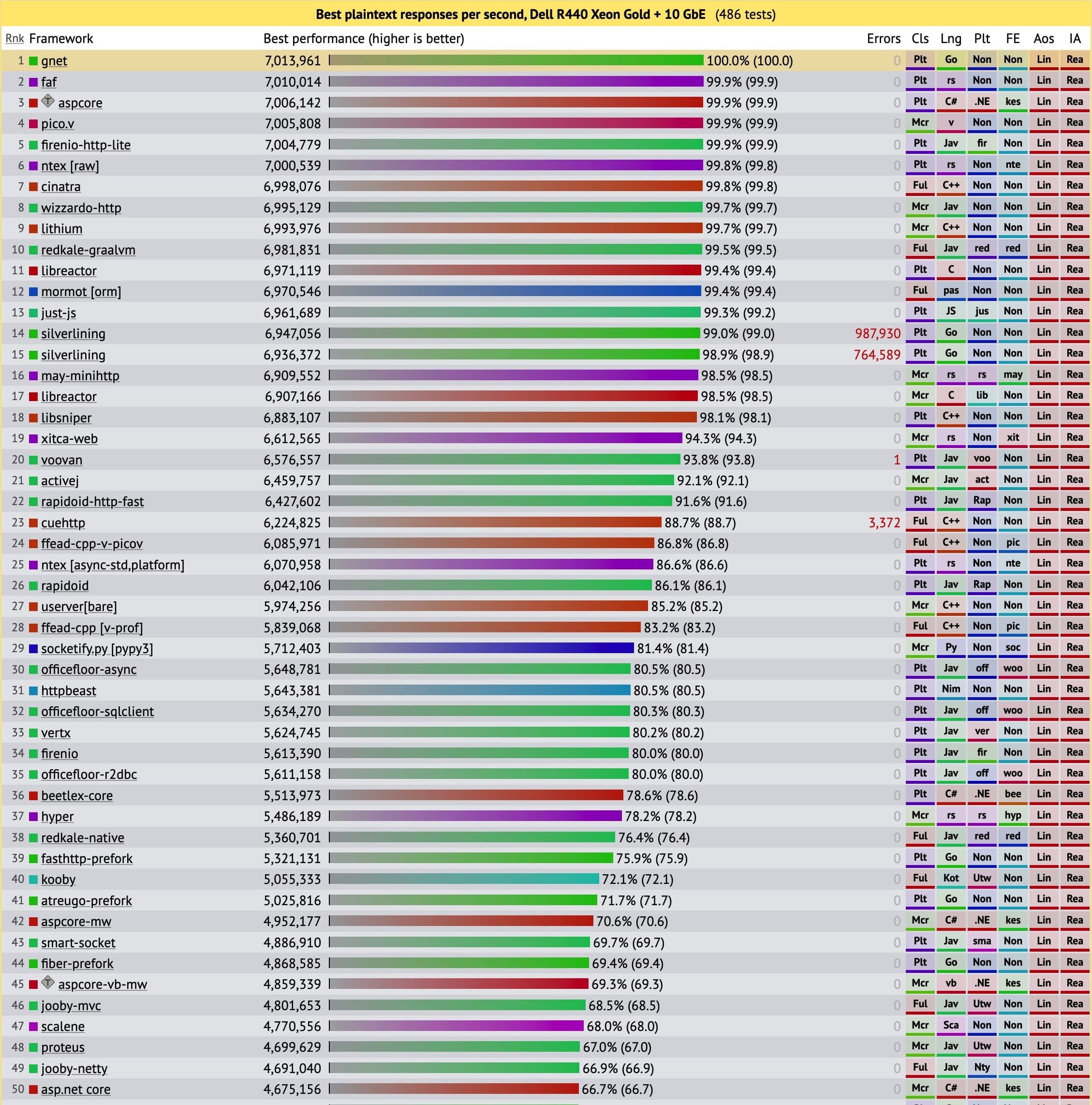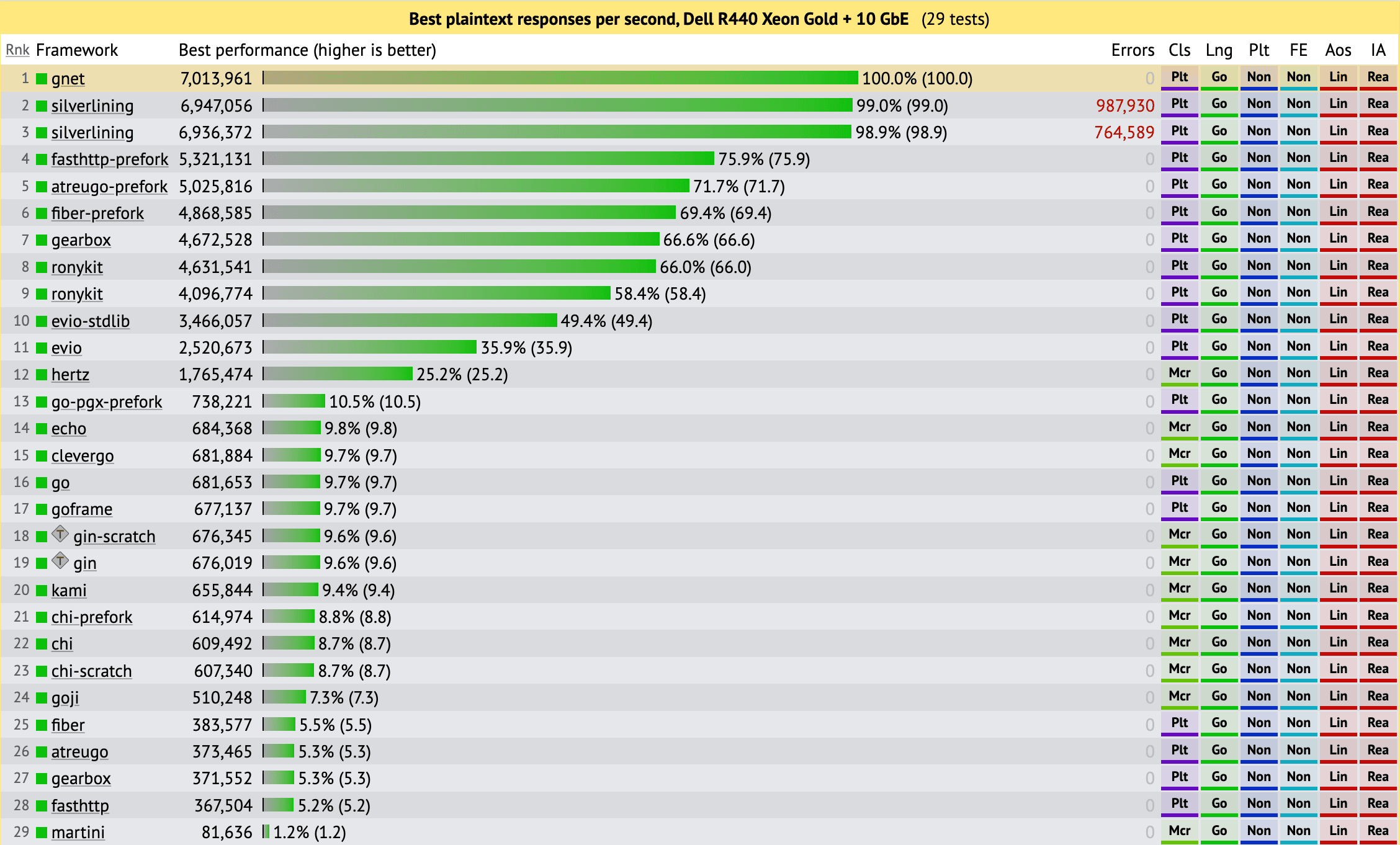English | 中文
📖 Introduction
gnet is an event-driven networking framework that is fast and lightweight. It makes direct epoll and kqueue syscalls rather than using the standard Go net package and works in a similar manner as netty and libuv, which makes gnet achieve a much higher performance than Go net.
gnet is not designed to displace the standard Go net package, but to create a networking client/server framework for Go that performs on par with Redis and Haproxy for networking packets handling (although it does not limit itself to these areas), therefore, gnet is not as comprehensive as Go net, it only provides the core functionalities (by a concise API set) of a networking application and it is not planned on being a full-featured networking framework, as I think net has done a good enough job in this area.
gnet sells itself as a high-performance, lightweight, non-blocking, event-driven networking framework written in pure Go which works on the transport layer with TCP/UDP protocols and Unix Domain Socket, so it allows developers to implement their own protocols(HTTP, RPC, WebSocket, Redis, etc.) of application layer upon gnet for building diversified network applications, for instance, you get an HTTP Server or Web Framework if you implement HTTP protocol upon gnet while you have a Redis Server done with the implementation of Redis protocol upon gnet and so on.
gnet derives from the project: evio while having a much higher performance and more features.
🚀 Features
- High-performance event-driven looping based on a networking model of multiple threads/goroutines
- Built-in goroutine pool powered by the library ants
- Lock-free during the entire runtime
- Concise and easy-to-use APIs
- Efficient, reusable, and elastic memory buffer: (Elastic-)Ring-Buffer, Linked-List-Buffer and Elastic-Mixed-Buffer
- Multiple protocols/IPC mechanisms:
TCP,UDP, andUnix Domain Socket - Multiple load-balancing algorithms:
Round-Robin,Source-Addr-Hash, andLeast-Connections - Two event-driven mechanisms:
epollon Linux andkqueueon FreeBSD/DragonFly/Darwin - Flexible ticker event
- Implementation of
gnetClient - Windows platform support (For compatibility in development only, do not use it in production)
- Multiple network addresses binding
- TLS support
- io_uring support
🎬 Getting started
gnet is available as a Go module and we highly recommend that you use gnet via Go Modules, with Go 1.11 Modules enabled (Go 1.11+), you can just simply add import "github.com/panjf2000/gnet/v2" to the codebase and run go mod download/go mod tidy or go [build|run|test] to download the necessary dependencies automatically.
With v2
go get -u github.com/panjf2000/gnet/v2With v1
go get -u github.com/panjf2000/gnet🎡 Use cases
The following companies/organizations use gnet as the underlying network service in production.
If you have gnet integrated into projects, feel free to open a pull request refreshing this list.
📊 Performance
Benchmarks on TechEmpower
# Hardware Environment
* 28 HT Cores Intel(R) Xeon(R) Gold 5120 CPU @ 2.20GHz
* 32GB RAM
* Ubuntu 18.04.3 4.15.0-88-generic #88-Ubuntu
* Dedicated Cisco 10-gigabit Ethernet switch
* Go1.19.x linux/amd64This is a leaderboard of the top 50 out of 499 frameworks that encompass various programming languages worldwide, in which gnet is ranked first.
This is the full framework ranking of Go and gnet tops all the other frameworks, which makes gnet the fastest networking framework in Go.
To see the full ranking list, visit TechEmpower Plaintext Benchmark.
Contrasts to the similar networking libraries
On Linux (epoll)
Test Environment
# Machine information
OS : Ubuntu 20.04/x86_64
CPU : 8 CPU cores, AMD EPYC 7K62 48-Core Processor
Memory : 16.0 GiB
# Go version and settings
Go Version : go1.17.2 linux/amd64
GOMAXPROCS : 8
# Benchmark parameters
TCP connections : 1000/2000/5000/10000
Packet size : 512/1024/2048/4096/8192/16384/32768/65536 bytes
Test duration : 15sEcho benchmark
On MacOS (kqueue)
Test Environment
# Machine information
OS : MacOS Big Sur/x86_64
CPU : 6 CPU cores, Intel(R) Core(TM) i7-9750H CPU @ 2.60GHz
Memory : 16.0 GiB
# Go version and settings
Go Version : go1.16.5 darwin/amd64
GOMAXPROCS : 12
# Benchmark parameters
TCP connections : 300/400/500/600/700
Packet size : 512/1024/2048/4096/8192 bytes
Test duration : 15sEcho benchmark
⚠️ License
The source code of gnet should be distributed under the Apache-2.0 license.
👏 Contributors
Please read the Contributing Guidelines before opening a PR and thank you to all the developers who already made contributions to gnet!
⚓ Relevant Articles
- A Million WebSockets and Go
- Going Infinite, handling 1M websockets connections in Go
- Go netpoller 原生网络模型之源码全面揭秘
- gnet: 一个轻量级且高性能的 Golang 网络库
- 最快的 Go 网络框架 gnet 来啦!
💰 Backers
Support us with a monthly donation and help us continue our activities.
💎 Sponsors
Become a bronze sponsor with a monthly donation of $10 and get your logo on our README on GitHub.
☕️ Buy me a coffee
Please be sure to leave your name, GitHub account, or other social media accounts when you donate by the following means so that I can add it to the list of donors as a token of my appreciation.
💴 Patrons
🔑 JetBrains OS licenses
gnet had been being developed with GoLand IDE under the free JetBrains Open Source license(s) granted by JetBrains s.r.o., hence I would like to express my thanks here.
🔋 Sponsorship
This project is supported by:





















